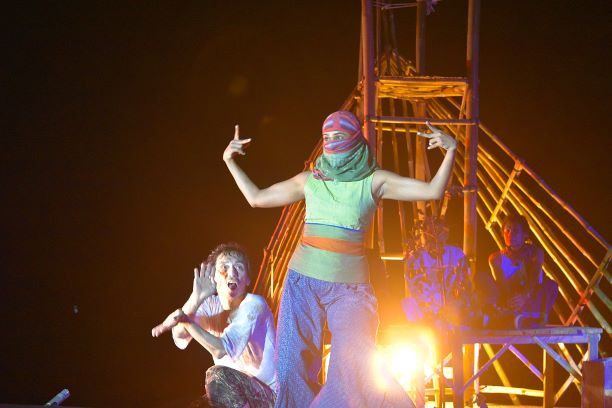
[ad_1]
The global health crisis may close some doors, but there is always leeway for creative minds.
In the case of an upcoming virtual theater performance in October, there is, quite literally, a multitude of open windows.
The connection between the theme of the upcoming theater performance Multitude of Peer Gynts and the global situation today is uncanny.
Broadly based on the fourth act of Norwegian dramatist Henrik Ibsen’s Peer Gynt, the project had focused on a theme of fear and anxiety as an excess of globalization, as well as on immobility and getting lost, just as the titular character experiences.
The project, which aims at investigating pluralism and intercultural connections, began in 2019 after two years of exploration and brainstorming among performing artists from Indonesia, Japan, Sri Lanka and Vietnam.
It gradually found its form after the performances at a beach in Larantuka, East Flores, in a studio in Tokyo before a select audience, and a two-week public show at the Shizuoka Performing Arts Center (SPAC) theater in Shizuoka, Japan.
 An experimental performance was staged on the beach of Larantuka in East Flores in July 2019. (multitudeofpeergynts.net/-)
An experimental performance was staged on the beach of Larantuka in East Flores in July 2019. (multitudeofpeergynts.net/-)
The coronavirus pandemic forced the cancellation of planned performances of the latest iteration of the work in progress that had been scheduled to take place in Yogyakarta and Jakarta in July, but it started another exploration for Teater Garasi/Garasi Performance Institute and the collaborators.
Director/producer Yudi Ahmad Tajudin said the limitations brought about by the physical distancing rules left the artists ample room to translate the project’s themes into separate performances.
And just like toy bricks, they would assemble to tackle the social issues encompassing the main theme.
“As it would be run as a virtual show, it would be done in a modular design in which the artists would perform at their own place either in real time or pre-recorded,” said Yudi during a virtual talk on Aug. 12 titled Theater and Pandemic: An Inter-Asia collaboration in ‘Multitude of Peer Gynts’ 2019-2020.
“We’re still finding a format for the work to have a dialogue with the current situation and the medium itself.”
The October performance would be presented on a website with interactive features resembling the experience of watching a live show on stage. The website would be up only for a month.
The issues explored by the performers include camera surveillance, data mining and even ghost workers (global workers who stay immobile in front of their computers).
“Immobility is included in the theme as we discussed the project last year, and this year, it’s as if the whole world is doing a performance on it,” said Yudi.
“And to keep it within context, we would also explore the use of cameras, the internet, the network […]. We are thinking that, even when there is a glitch in the network connection, we could make it part of the performance, the aesthetic of it,” he added.
Playwright Ugoran Prasad, currently residing in Sydney, Australia, said the virtual performance at first was unthinkable.
“Teater Garasi by nature is not a theater group that comes with a grand design for each of its performances. There is no script prepared beforehand, but instead interaction with the performers either through discussions or rehearsals to come up with ideas. And that requires physical interaction.
“Surprisingly, regardless of the time differences and work flow, I could have an intensive discussion with the performers. On top of that, their ideas and the final work are beyond expectations,” he said.
The performance by Papuan contemporary dancer Darlane Litaay, for example, plays on camera angles and lighting in his exploration of anxiety.
The talk was also attended by Takahashi Yuichi, director general of the Japan Foundation in Jakarta, representing the sponsor of the project.
Aside from the Tourism and Creative Economy Ministry and the Education and Culture Ministry, the project is also supported by SPAC as co-producer, the Japan Foundation-Asia Center and the Saison Foundation.
The two latter organizations are known to support art projects in East Asia and Southeast Asia.
The project also won an Ibsen Scholarship from Norway’s Ibsen Awards last November. The biennial endowment awarded by the Ibsen Foundation for innovative projects that combine art performances with social criticism through the work of the playwright.
The main collaborators on the project are Japanese performer Micari, performance artist Takao Kawaguchi and composer/sound artist Yasuhiro Morinaga, Sri Lankan dancer Venuri Perera and Vietnamese artist Nguyễn Mạnh Hùng.
The latest changes have made room for more collaborators, including visual artist Woto “Wok The Rock” Wibowo, musician Nya Ina Raseuki and performers Darlane Litaay, Abdi Karya, and Andreas Ari Dwiyanto.
“A virtual performance cannot replace the liveness of a live stage, and we should not apply the measures used in a live stage here. It’s a new experiment, and there is a possibility of failure, but it excites us,” said Yudi.
Your premium period will expire in 0 day(s)
close x

Subscribe to get unlimited access Get 50% off now
[ad_2]
Source link